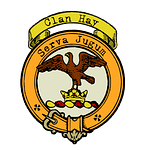Welcome back to "A Clan A Day Podcast," brought to you by bagtownclans.com. I'm your host, Colin MacDonald. Today, we turn our focus to Clan MacQueen, a Highland clan with a fascinating history intertwined with the great confederations of Scotland, a shared lineage with Clan Donald, and a lasting legacy within the Chattan Confederation. Join me as we uncover the story of Clan MacQueen, also known as Clan Revan, a name as evocative as their history.
The roots of Clan MacQueen trace back to multiple origins, including Gaelic and Norse influences. The name itself is often rendered as MacShuibhne, meaning "son of Sweyn" in Old Norse, or MacCuinn, which translates to "son of Conn" in Gaelic. These etymologies hint at the clan's deep connections to both the Viking world and the Celtic High Kings of Ireland.
The founder of the clan is believed to be Roderic Dhu Recan MacSweyn—or MacQueen—who received a grant of territory in Inverness-shire at the dawn of the 15th century. He is said to have belonged to the powerful family of the Lords of the Isles. Roderic's descendants, later called Clan Revan, established themselves as a distinct Highland tribe and became known for their fierce loyalty and martial prowess.
In 1411, Clan MacQueen cemented its place in history by fighting under the standard of Clan Mackintosh at the Battle of Harlaw. This bloody conflict, between Highland forces led by Donald of Islay, Lord of the Isles, and the Lowland army under the Earl of Mar, remains one of the most storied battles of Scottish history. The MacQueens’ participation alongside Clan Mackintosh marked the beginning of their integration into the Clan Chattan Confederation—a powerful alliance of Highland clans.
This affiliation was formally recognized in 1609, when Donald MacQueen of Corrybrough, the clan’s hereditary chief, signed a bond of manrent with the chiefs of the other clans within the Chattan Confederation. This agreement bound the MacQueens to support Angus Mackintosh of that ilk as their captain and leader, solidifying their ties to the Mackintoshes.
The MacQueens' most prominent branch, the MacQueens of Corrybrough, became well-established in Strathdearn, Inverness-shire. At their peak, the clan comprised twelve distinct families, all of whom owned land in Inverness and Nairn. Their lands in Corrybrough became a stronghold and a symbol of their influence in the Highlands.
However, the end of the 18th century saw the decline of the clan’s territorial holdings. The passing of the chief John Fraser MacQueen in 1881 marked the final chapter of the MacQueens of Corrybrough, as the family’s lands were lost, and their descendants scattered across the globe.
The MacQueens maintained a strong kinship with Clan Donald, to whom they attributed their origins. In 1778, Lord MacDonald of Sleat raised a Highland regiment and proudly appointed a MacQueen of Corrybrough as a lieutenant, acknowledging the MacQueens' unwavering loyalty and service to the MacDonald lineage.
This connection is further reflected in the clan’s shared cultural symbols. For instance, the MacQueen tartan incorporates elements of both the MacDonald and Mackintosh tartans, a visual representation of their historical alliances.
Throughout their history, the MacQueens produced figures of note in Scottish society. One such figure was Donald MacQueen, a minister from Snizort in the Hebrides, who impressed the famous Dr. Samuel Johnson with his intellect during Johnson's visit to the islands in the 18th century. Another, Robert MacQueen, Lord Braxfield, earned notoriety as a judge known for his harsh sentences. Although not directly tied to the Highland clan, he embodied the MacQueen name in an era when justice was severe and unyielding.
Today, Clan MacQueen is considered armigerous, as it no longer has a recognized chief. The clan's crest depicts a wolf rampant, symbolizing strength and vigilance, and their motto, "Constant and Faithful," speaks to the loyalty that defined their history. The plant badges associated with the MacQueens include boxwood, red whortleberry, and common heath, reflecting their dual associations with the Chattan Confederation and Clan Donald.
While the MacQueens' influence in Scotland waned after the 18th century, their legacy endures among the Scottish diaspora. Many descendants of Clan MacQueen emigrated to New Zealand, North America, and beyond, where they continue to honor their heritage.
From their Norse-Gaelic roots to their alliances with Clan Chattan and Clan Donald, the MacQueens' story is one of resilience and adaptability. They were warriors, landowners, and intellectuals who left an indelible mark on Highland history. Though now dispersed, the spirit of Clan MacQueen lives on in their motto, "Constant and Faithful," a fitting tribute to a remarkable clan.
Thank you for joining us on "A Clan A Day Podcast." I'm Colin MacDonald, and I hope you enjoyed exploring the history of Clan MacQueen with me. Be sure to tune in tomorrow as we uncover the story of another fascinating Scottish clan. Until then, slàinte mhath!













Share this post